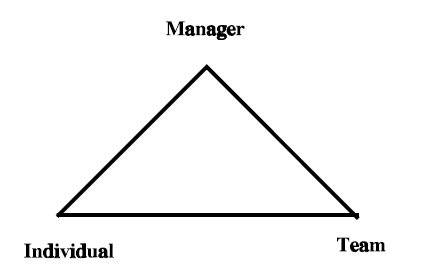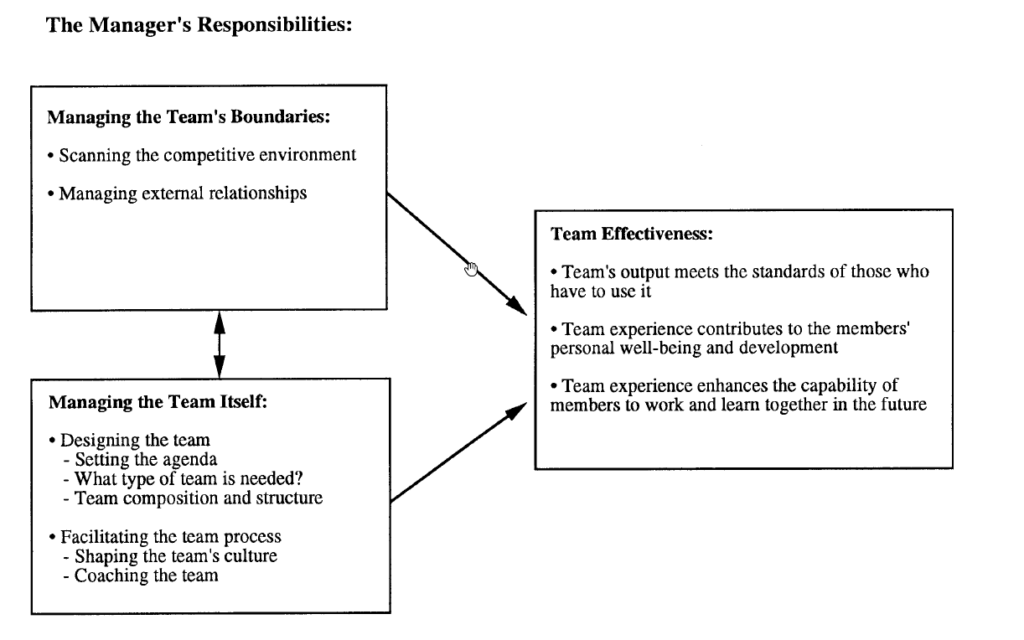- Young managers, instead of looking at the team as a collective, are more invested in individual relationships with their subordinates
- Two sets of responsibilities when it comes to managing an effective team:
- Managing the team’s boundary – scanning the competitive environment and managing relationships with those on whom the team is interdependent (internally in the org)
- Managing the team itself – designing the team and facilitating the team process
- Assessing team effectiveness:
- Does the team’s output (decisions, products, services) meet the standard of those who have to use it?
- Does the team experience contribute to the personal well-being and development of the members?
- Does the team experience enhance the capability of the members to work and learn together in the future?
- Managers often only rely on the first dimension here
- Managing the team itself:
- Designing the team
- Setting the agenda: members need a clear and compelling sense of what is expected of the team. Also how that fits into the overall org vision
- What type of framework is needed: how much and what kind of coordination is necessary for the team to fulfill its agenda?
- Team composition and structure: manager must choose team members with the necessary knowledge and skills to fulfill the team’s agenda. The team is only as strong as the weakest link
- Facilitating the team process:
- Shaping the team’s culture: managers should try to influence, as much as possible, certain manifestations of the team’s culture: the team norms, routines, and values.
- Distribution of power and influence
- Communication patterns in the group
- What topics are considered legitimate for discussion
- How conflicts are managed
- Shaping the team’s culture: managers should try to influence, as much as possible, certain manifestations of the team’s culture: the team norms, routines, and values.
- Coaching the team: the manager need to guide and coach about how to be an effective team member by providing timely and specific feedback to team members about their role on the team and their impact on the team process and performance
- Designing the team
- In diagnosing team process, it is helpful to keep in mind that teams have to overcome three process hurdles in order to realize the synergy associated with team work
- They must exert sufficient effort to get the task accomplished at acceptable levels of performance
- Bring adequate levels of knowledge and skill to bear on the task at hand
- Employ task performance strategies (the way the team goes about getting its work down) that are appropriate to the work and situation
- Great teams do not start out great. They only get that way through experience and practice
- Managing paradox
- Embrace individual differences and collective identity and goals: for the team to benefit from the diversity, the team has to have a process that allows for the different voices – perspectives, priorities, styles – to be expressed and heard.
- Foster support and confrontation among team members: the team needs to develop a culture of trust that encourages team members to support one another
- Focus on performance and learning and development: producing results today while having an equally strong concern for generating innovation for tomorrow is not easy given the pressures managers face. Mistakes have to be treated as sources of learning rather than reasons for punishment, if risk-taking, and hence development and innovation, are to be encouraged
- Balance managerial authority and team member discretion and autonomy: achieving a delicate balance between the authority of the manager and the discretion and autonomy of the team. Managers cannot delegate final accountability for the team’s performance and delegation does not mean giving up control. The more autonomy given to the team members, the more important it is that they be committed to a common agenda. In well-functioning teams in which there is a high degree of mutual trust, managers are given more latitude to decide things without having to explain or justify their actions. By contrast, in less effective teams where there is often little trust, team members will question even the most innocent suggestion manager makes.
- Attend to the triangle of relationships: managers, because of their formal tuthority, in the end, are not members of the team

The Manager’s Responsibilities

